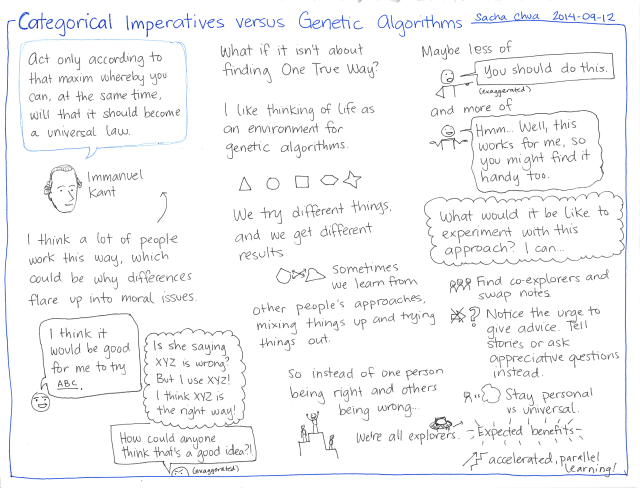Categorical imperatives versus genetic algorithms
Posted: - Modified: | philosophyI was thinking about why I like thinking in terms of experiments, and how that's related to how I generally don't have strong disagreements with people.
I think most people I spend time with have a “live and let live” sort of policy similar to mine. We explore different life paths and have different opinions, but that's okay. It results in more information and more insight.
Sometimes I come across people who express their opinions more strongly. Reading Reddit posts about people dealing with strong and probably well-meaning advice reminds me that there are people out there who are firmly convinced they know what's good for you. I know I sometimes slip into that kind of advice-giving mode myself, especially around things that give me heebie-jeebies.
I like the idea that most of us are figuring things out in good faith. I haven't thought through the limits of this idea yet (one's choices might limit someone else's, for example), but there might be something there worth exploring.


4 comments
Clarissa Littler
2014-09-23T16:41:00ZSo my view of things tends to be pretty similar, I think.
For example, as someone who works in the field of programming languages, I see A Lot of very strong opinions about what's the one true way to do things, what's the one true programming paradigm, etc. and, well, I just don't know how to feel that strongly about it. I have my own passions and biases, but in the end I recognize that different people's brains work in different ways and that, far from being a flaw, that's a very good thing! So when I'm asked about programming languages, I generally just tell people to try various things until they find something that meshes well with their brain.
On a bit of a darker note, prescriptivism tends to really rear its head in talking about mental disability and recovery from trauma. There are a million books and blog posts telling you the one true way you're allowed to be mentally ill and the exact steps you should take to fix yourself, but again I think everyone's neural wiring is different enough that there literally can't be just one universally optimum solution and that's okay!
simon
2014-09-24T21:43:44ZHey there! I just stumbled upon this nice blog while googling for some info about animations in emacs and I couldn't help reading this latest post of yours... and I thought why not leave a quick comment : ). I have often wondered why we have such strong opinions about some things and less stronger ones about others and also why some ppl have especially strong opinions about almost everything and seem less able/willing to consider alternatives on equal footing. I like the "experimentalist" approach that you sketch Sacha (even though I am a theoretical physicist ;-). When I consider the topics about which I have pretty strong opinions I realize that most of them have something to do with my personal experiences. In that sense I suppose one could say that experimenting can also lead to the formation of strong opinions ? I feel opinions are our attempts to find or impose consistency on observed or experienced correlations among things in our lives. Perhaps some ppl find it easy to adapt their opinions based on observations and experiences of others while others have a hard time with that believing perhaps only in the validity of their own observations? Being a great believer in the delicate balance of things I guess the optimum should be somewhere in between : ). Greetings from Switzerland and have a nice day.
Matthew
2014-09-25T10:56:14ZHi! I've found your blog when looking around for org mode advice and guides, but have stuck around as I've found a lot more. Just wanted to say that I really enjoy it and find it extremely interesting.
This post is particularly great (i.e. I completely agree with it :) and love the metaphor of evolution applied to moral and ethical choices. It really resonates with me. What would you say to people who would accuse of sliding into moral relativism though? I generally take the line that it is your personal responsibility to figure out what being moral means and that a universal moral system seems to only be possible if bestowed upon us by god. This argument is not very convincing though and the idea of no universal ethical code seems monstrous to people.
William Clifford
2014-09-27T22:54:24ZThank you for this thoughtful post.
I wonder, if taking the experimentalist attitude would be good for you, perhaps it would be good for others--your neighbors and friends to join you in this? If it would be good for you and your neighbors and friends, perhaps it would be good for your community leaders, maybe even good for everyone in the community to share it in some degree? If it's good for your community, perhaps it would be good for everyone in our society and culture to at least adopt in some fashion? If it's benefits our society to become more experimentalist, perhaps it would be good for other societies too. If everyone benefits from this worldview, and the benefits of it increase or improve as it becomes more widely and fully adopted, perhaps we can say it is a general virtue, or universal good?
If this seems like a reasonable approach for the virtue of the experimentalist attitude (and I think it is) perhaps it would be useful in finding others? Perhaps it would be useful in finding limits, constraints, and conditions, of less-than-universal virtues? Perhaps it would be helpful in finding tests for proposed virtues, for measuring, or applying them, or discovering new ones? Perhaps we don't have to say that morality is subjective or arbitrary, but discoverable and measurable?
If so, perhaps we should reconsider this proposed dichotomy of categorical imperatives and genetic algorithms?
Thanks again!